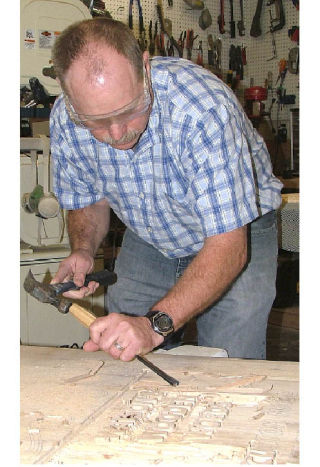Tom Watson knows how to go with the grain. It’s a skill he picked up during his childhood while watching his father work in his workshop, amidst the smell of fresh cedar, pine and oak shavings.
Today, the 57-year-old Bonney Lake man has taken the skilled trade passed down from another generation and carved out a new legacy, Watson’s Wooden Words – a business featuring one-of-a-kind, hand-designed signs.
“I like things natural, versus painted,” he said, and credited his dad’s love of nature for the influence. “My dad was a park ranger in California. He made signs for his job.”
Even his brother picked up on woodworking skills and produced hand-made bowls.
While Watson carries on his father’s craftsmanship, he’s added the use of modern tools of the trade not available in his dad’s day: a software program known as Computer Numerical Control, or CNC.
“I can take any image and put it on a board,” he said. “All my designs are hand-carved.”
Each creation is a time-consuming work of art that is as unique as its customers: there’s the set of infant footprints, accompanied by a baby’s name and date of birth; a wife’s name gracefully carved and painted in pink next to tulips, her favorite color and commissioned as a gift from her husband; a Beautify Bonney Lake sign, complete with Mount Rainier looming in the background; and numerous signs for businesses, including a towing company and housecleaning service.
One of Watson’s customers is David Colbeth, a real estate professional with Windermere Real Estate in Lake Tapps. Colbeth asked Watson to create signs for customers moving into their new residences, complete with the families’ last names and a Pacific Northwest theme. Colbeth uses each finished work of art as a “welcome” gift when the homeowners are presented with the keys to their home.
“Tom does a very beautiful job,” Colbeth said.
Watson’s work also graces the streets of Orting.
“The businesses within the city have to follow a 1900s look,” he said.
From a blank board to finished sign, carving the right words or pictures generally involves a seven-step process. First, he and the customer choose a design on the computer; next, he applies that design to the CNC machine, followed by cutting away to the customer’s specifications, he said. He uses a sander to detail the work and then a spiral saw to clean up images, such as evergreen tree branches – a customer favorite; next, he sands again to create intrinsic features and finally, applies stain and a water sealant.
The tedious work results in detailed images of scenes highlighting mountains, deer and horses, to name a few.
Large designs require the pattern drawn out on paper and then adhered to the board, he said, much as a tailor might use a paper pattern on top of fabric prior to cutting. “Then I use a router and a gauge to carve it out,” he said. The average sign’s turn-around takes two weeks.
The work may seem tedious but to Watson, the time he invests is worthwhile.
“It’s very fulfilling to me,” he said. “It’s relaxing. I can spend all day out here in the shop, fulfilling their ideas.”
Additional information is available by visiting www.watsonswoodenwords.com or by calling 253-951-6385.
To comment on this story view it online at www.blscourierherald. Reach Judy Halone at jhalone@courierherald.com or 360-802-8210.


